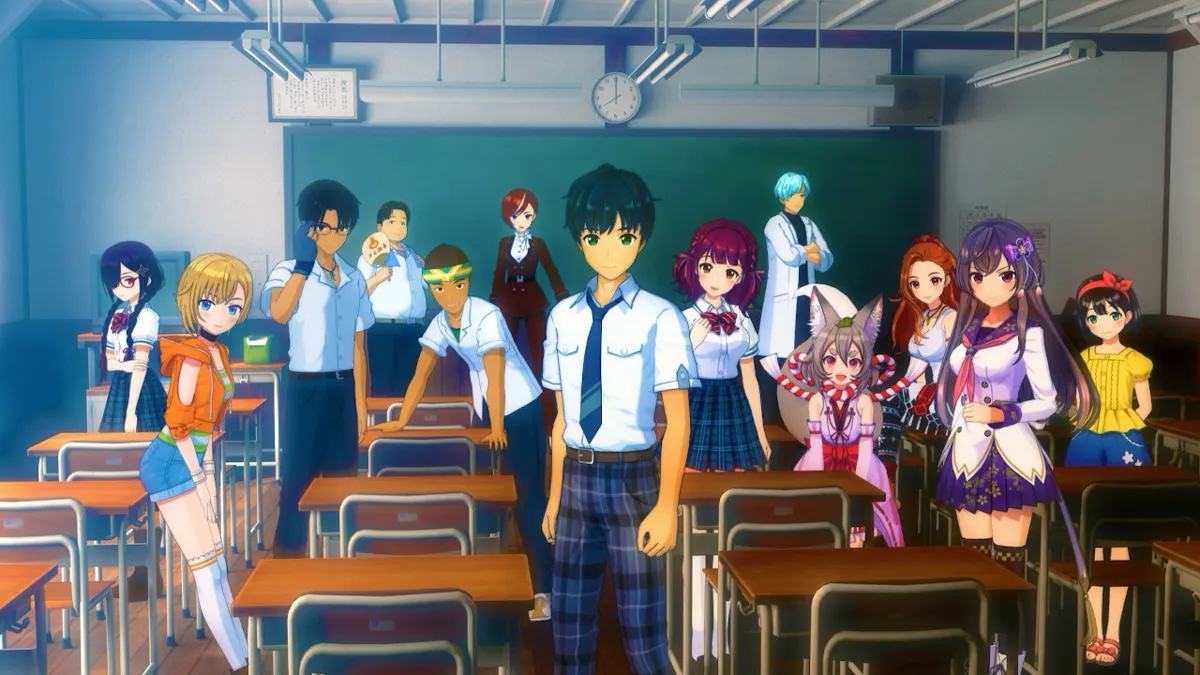Come again?
What’s important to know about ループ8: 神々の夏, and possibly the reason why we haven’t seen a demo for it yet, is that it’s not an RPG in the traditional sense. Yes, there are stats to build and monsters to fight, but the latter is a small part of the final package, while the former is achieved through completing a small number of tasks each in-game day. It’s better to think of Loop8 as a social simulator rather than an RPG. Just picture the Princess Maker series and you’re halfway there.
ループ8: 神々の夏 (PC, PS4, Switch [reviewed], Xbox One)
Developer: SIEG Games
Publisher: Xseed Games
Release: June 6, 2023
MSRP: $49.99
As Nini, the newest arrival in the quaint seaside town of Ashihara, you’re there to protect the village from the invading spirits called Kegai while making friends, building bonds, and discovering the backstories of the only other 12 people in town. Each day, you’re free to do with Nini what you please. You can head to school for some optional summer learning, find a specific person to chat with, or build up your stats at one of Ashihara’s training areas. If you want to get to know a person, you can chat them up as they go about their day or ask them to join you as you move around town. Time moves swiftly each day, and when you engage in an activity like studying a map of Japan, it jumps the clock ahead.
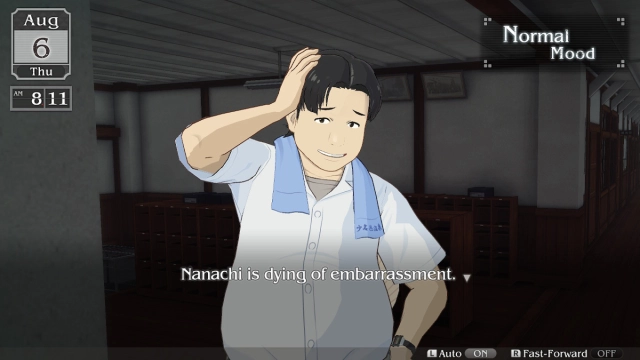
Eventually, a Kegai will possess one of the town’s folk. You’re given hints on who it is, and when you figure it out and approach them in the right spot in Ashihara (or just happen upon them, as happened to me once or twice), a portal to a mirror version of the town opens up. Once somebody is possessed by a Kegai, you only have a few days to build your team up and defeat them. If you can’t get it done in that time or accidentally kill someone you meant to keep alive, Nini can reset the world back to his first day in town.
That is the titular gameplay loop of Loop8. Your objective is to survive until the end of the month, though the game really doesn’t spell this out for you. Loop8 is light on direction and purpose as it would rather players define their own adventure and tell their own story through its extensive social system. Xseed has done much to pump up the game’s “emotion-driven AI system,” otherwise known as the Karel System, but it might take you a few loops to see it have any sort of effect. The general idea behind it is every action you take in the game will impact what characters say and do. If you’re mean to someone, their hatred for you may come back to bite you in the ass should Nini face them in battle. In theory, the Karel System promises unique experiences through each loop you run. In practice…
Back at one
Looping narratives are nothing new. With most games, your protagonist is aware of what’s happening and uses their experience to improve the next run or loop they make. Loop8 takes a different approach. While some stats carry over across loops, everything else resets to their base when you start anew. Not only does this mean you’ll have to start training from scratch, but you’ll also have to start building up those relationships again, going through the same conversations, experiencing the same events, and watching as Nini has the same revelations.
To its credit, you can regain what you lost in the loop far more quickly than when you earned it the first time. So if you make progress building a budding friendship with Nanachi, the town otaku, you’ll be able to charm him quicker in your next run of it. The stats you get from training around town also rebuild quickly, even if their importance pales in comparison to the blessings you get.
Musasa, a mythical flying squirrel-thing, is a creature you’re going to see a lot in this game. Whenever you visit a shrine around town and often when you chat with a person, this little guy will pop up and offer a blessing from a god. Blessings build up your various stats, and they’re the only things that carry over to the start of each loop. The type of blessing you get is largely random, but who is blessed depends on your actions. If Nini visits a shrine while alone, the blessing will go to him. If you visit a shrine with another person, or if Musasa appears after you talk to somebody, the blessing will often — if not always — go to them. The more blessings you receive for Nini and the rest of the people around town, the more useful they’ll be in the mirror world.
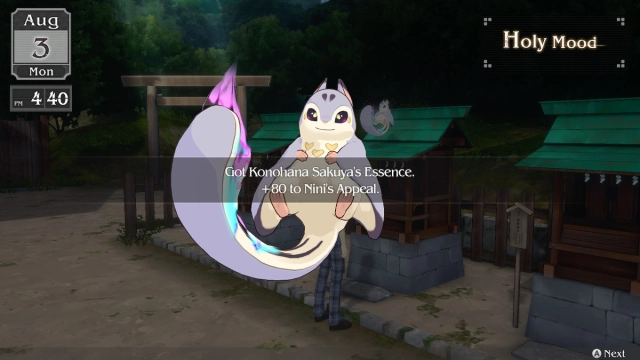
Because Musasa pops up so frequently during this game, I highly recommend everyone updates to version 1.02 before playing as it includes the option to skip the blessing animations.
Trust me on this one.
It’s just emotions taking me over
For the first 10 hours of Loop8, I struggled to get my bearings on what I should focus on. The Karel System didn’t feel like it was making any impact, whether in battle or in general conversations. I understood how my choices in chats improved or whittled away at my connections to people in town, but it’s hard to really care about those choices when oftentimes, your reward for moving your relationship forward was just a simple “thanks.” I also found it hard to care when some conversations triggered events almost at random. I’m sure they’re not random and there was something I had done, some relationship status I had met, to trigger these events. But I could not tell you the steps I took to unlock them.
Each character has three emotion levels — friendship, affection, and hate — that are impacted by the choices you make. The friendlier you are with someone, the more options you’ll have in conversations. As your friendship grows, you’ll be able to suggest activities, train together, and even go on dates. The more someone hates you…well, actually, I don’t know what happens when somebody hates Nini because everyone loved him through all of my runs. The only people who hated Nini were likely the ones I killed, but that was easy enough to reset with another loop.
Understanding how the people of Ashihara feel about one another is the key to getting everyone to the end of August alive. Adding someone to your party who has a strong emotional connection with the person possessed by the Kegai can impact the outcome of the battle. I didn’t want to kill the people I killed in the game, but I wasn’t given an option for most of them because they didn’t have a connection to the members of my party. That’s why it’s important to figure out who is possessed early on, so you can build a rapport with those they share emotional ties with. It took me one too many loops to figure that out, but once I did, I got a clearer vision of how to proceed. Unfortunately, going forward sometimes meant going back to the start.
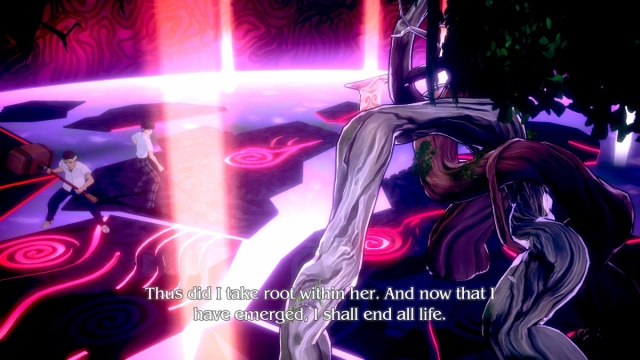
I don’t want to fight you
Each loop I took added up to hours of repetitive gameplay. Going through the same conversations wears thin quickly, and each loop can last up to seven hours depending on your actions and how satisfied you are with your trajectory. I had a loop where I nearly made it to the end of the month only to have Saru, my BFF of that run, die in the closing seconds of battle. Heartbroken, I had a choice: do I loop and go through the motions again, or boot up my last save?
Obviously, I went with the latter option.
Playing through Loop8 is akin to a war of attrition. The game does its best to wear me down with its repetitious nature, while I did my best to persevere and earn all those blessings. Whatever fun I had in the first few hours of my time had run dry by the time I landed on the final day of my last loop. Even the battles of Loop8, while wonderfully cinematic in design, couldn’t turn the tide of my feelings toward the game.
Don’t expect too much fighting or any extensive dungeons in Ashihara. Nini and friends will only fight in a mirror version of the town, and while there are skirmishes to engage in, you can make a beeline for the boss without penalty. In battle, you have full control over Nini while your partners are controlled by the AI, allegedly making their decisions in battle based on their connection to you, your other party member, and the Kegai-possessed enemy. You can attack using one of the three emotions with hate doing the most damage.
However, the more you use hate, the more powerful your enemy can get. I stuck with friendship and affection attacks and did just fine, keeping the enemy’s strength at a minimum for most of my battles. I did die or lose companions in my earliest loops, but as I completed more runs, received more blessings, and made stronger connections, whatever challenges I’d previously faced subsided. After many tries with things never quite going my way, I was finally able to get myself in a loop where it was clear everyone would still be breathing by the time September rolled around.
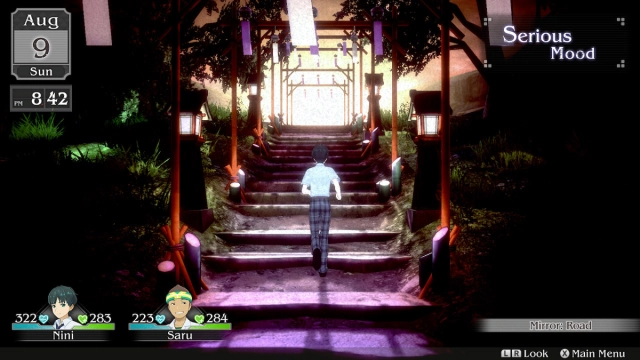
At that point, I had put in far more hours than I ever intended to or should have. And it didn’t feel like I was winning because of my strategy or skill. I was winning because I spent enough hours cheesing the Karel System until it was nearly impossible for me to lose.
Here you come again
As I made each loop in Loop8, I realized the systems I once found obtuse were rather elementary. Once I dropped my expectations of how I thought this game should be played — such as trying to build up the strength stat based on the misguided notion it would grant Nini stronger attacks — I started to see this game for what it is. Loop8 has a strong aura of “proof of concept” about it.
It’s an experiment in game design, one that doesn’t work as well as it should. The time-consuming repetition of each loop is an enthusiasm killer, while the Karel System doesn’t really have the impact it ought to. You’re given little aid in helping understand which actions lead to which results, and the conversation system at the heart of each personal interaction can feel like busy work, routinely forcing you to talk to someone five or six times in a row to get through all their preset dialogue before you get access to the conversation choices. To make it through to the end, at least if you want a good ending, you’ll need to rinse and repeat a lot, and I’m just not sure how many people will subject themselves to hours of limited gameplay and recurring dialogue.
For all of its rough edges, and there are plenty of them, I still think ループ8: 神々の夏 is one of the most interesting games I’ll play this year. It also might be the most disappointing game I’ll play this year. There is a lot of potential in the individual ideas and concepts on display here, but that potential is stuck behind some exhausting design decisions that drained the game of whatever joy it sought to provide me.
